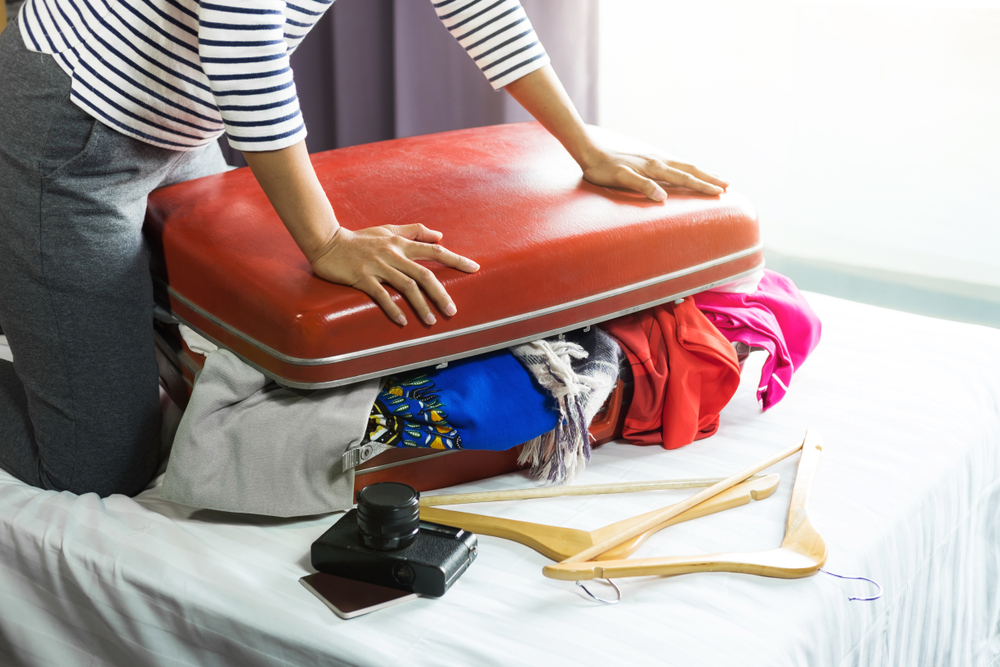The moving process can keep you awake at night. The stress and pressure build up, leaving you with insomnia. For some, moving is an actual, waking nightmare. The worst possible scenario plays out in real time, leaving them utterly helpless. The worst part? These situations can happen to anyone — including you. With preparation, however, your move can go smoothly.
Your Lease Runs Out Before You’re Able to Move
The Nightmare: You’re currently leasing an apartment before moving into your dream home, but the house isn’t quite ready yet. Unfortunately, you were banking on it being ready by a certain date. Now the lease on your apartment is up and you have nowhere to live.
The Solution: Talk to your landlord about staying and paying a prorated amount, which means paying the cost of each day individually rather than a month at a time. A $1,500-per-month apartment, for example, would be prorated at about $50 per day (depending upon the month). If that isn’t possible, try to keep your stuff in a rental truck or PODS unit. It’s less of a hassle than moving it between garages or storage units.
The Movers Bail on You at the Last Minute

The Nightmare: You have set a moving date and hired a moving company. The movers have offered you a fair rate and agreed to show up at a certain time — except that time was two hours ago and there’s no sign of them. Have they simply forgotten, or have they double-booked? Or, even worse, have you been scammed?
The Solution: Making sure your movers don’t bail on you starts by choosing the right movers. Be on the lookout for moving scams and sketchy business practices, and select a mover that you can count on!
Still worried? Make a contingency plan. Whether it’s calling friends with large vehicles or renting a truck yourself, make sure you have a Plan B. Additionally, schedule your move well in advance. Waiting until the last minute makes you more likely to get lost in the shuffle.
You Injure Yourself During the Move
The Nightmare: Moving can be back-breaking work — literally. It’s easy to injure yourself accidentally while preparing to move. It may be a minor wound, like a cut or bruised toe, but it could also be debilitating. Torn rotator cuffs, thrown-out backs, and broken bones can all occur while moving.
The Solution: Stretch your arms, legs, and back before you lift anything and then lift with your legs, not your back. If the item is too heavy, ask for assistance from a friend or use a dolly. Take breaks and drink plenty of water to avoid dehydration.
When in doubt, hire a moving company — that’s what they’re for! If you hurt yourself moving something you shouldn’t have messed with, you’ll likely end up spending a lot more on medical bills than you saved on movers.
Your Pet Goes Missing

The Nightmare: Everything is at your new home, safe and sound. You’re unpacking your dog’s toys and food when you realize you haven’t seen him since you arrived. Your family searches every room, but the dog remains missing. Did you leave him at the old house, or did he manage to escape?
The Solution: Part of moving with a pet is making sure they’re secure on moving day. Board your pet at a kennel or pet daycare on moving day. If there’s no daycare service available, see if a friend can watch them at their home for a few hours. Ideally, you’d want to have the pet under someone else’s care before the movers arrive. It’s easy for pets — especially smaller critters — to get lost or hurt when everything is moving.
Your Furniture Gets Damaged
The Nightmare: You’ve packed all your items securely and left them in the seemingly capable and careful hands of the moving company. But then you’re unpacking at the new place and you find that your grandmother’s china broke during the move — an irreplaceable family heirloom gone.
The Solution: If you have moving insurance, you’re already covered for that situation. If you didn’t purchase insurance, go over your contract with the moving company. There should be a clause or statement regarding what to do if something gets damaged. Make sure you report the damage as soon as you find it, since many contracts accept damage claims only within a certain amount of time.
You Don’t Know Which Box to Unpack to Find the Paper Towels, or the Soap, or…
The Nightmare: The move went off without a hitch. You have dealt with a good number of boxes, so you decide to take a break for dinner. But where are the plates? And the napkins and paper towels? Now you have to drive to the store to buy utensils even though you know you packed them.
The Solution: Pack an essentials box and ensure it’s one of the first things you bring inside the house. The box should contain items such as towels, soap, paper products, and a first-aid kit. If it’s an everyday object you can’t do without, include it. The essentials box will make your first night in your new home far less stressful. Think about what you’ll want to do when you arrive — for example, dust the baseboards before positioning the furniture — and put related items in your box of essentials. Be sure to label all boxes — including this one! — clearly so you can find what you need when you need it, even if it’s not in the essentials box.
You Have Too Much Stuff

The Nightmare: You’ve just returned from the store with boxes to begin packing. Everything is going well, except you’re starting to run low on boxes. But how? You’ve already had an estimate done, and you have far more stuff than you imagined. Where did all the extra stuff even come from?
The Solution: Go through all your stuff again and sort it. Get rid of anything you no longer use or care for, whether by throwing it away or donating it to a charity or the local Goodwill. Alternatively, try having a garage sale if you have time to set one up. It’ll lessen your burden and add a little cash to your pocket. You could also try selling it on an online marketplace or app.
Your Furniture Doesn’t Fit
The Nightmare: Less than a year ago, you bought a lovely new couch. It’s the perfect color and firmness, with plenty of room to stretch out. You’re excited to use it in your new home, but the movers deliver heartbreaking news: The couch doesn’t fit through the front door.
The Solution: As frustrating as it can be, you’ll need to disassemble and re-assemble the furniture once it’s inside. Luckily, many beds and couches have removable legs or headboards. Removing those larger parts may be enough to get the furniture inside without fully disassembling it. (Unfortunately, not much can be done if the furniture is still too large to fit inside your new place.)
Your Movers Want More Money Than You Expected
The Nightmare: It’s moving day, and you’re ready to start this new chapter of your life — until you're hit with a final moving bill that's way higher than your initial estimate. It’s a common and unwelcome surprise for many people, turning an already stressful day into a financial fright.
Moving costs can balloon due to unexpected fees, added services, or unscrupulous movers who lowball initial estimates only to tack on extra charges later. Whether it’s a last-minute packing service fee or a “long carry” charge for moving your items farther than expected, the costs add up quickly and leave you to pay far more than planned.
The Solution: To avoid this moving nightmare, it’s crucial to hire reputable movers. Do your homework before choosing a moving company.
- Get multiple estimates: That will give you a better idea of the expected cost and help you spot unusually low estimates that may be too good to be true.
- Read reviews and check references: See what previous customers have to say about their honesty and reliability.
- Ask for a detailed contract: Ensure all potential fees are outlined, and insist on a binding estimate when possible.
Not all movers play fair. Some may offer an attractively low estimate to get your business, only to revise the number drastically when you’re most vulnerable — on moving day. By choosing a trustworthy company and understanding exactly what you’re being charged for, you can protect yourself against unexpected financial woes and keep your move on budget.


